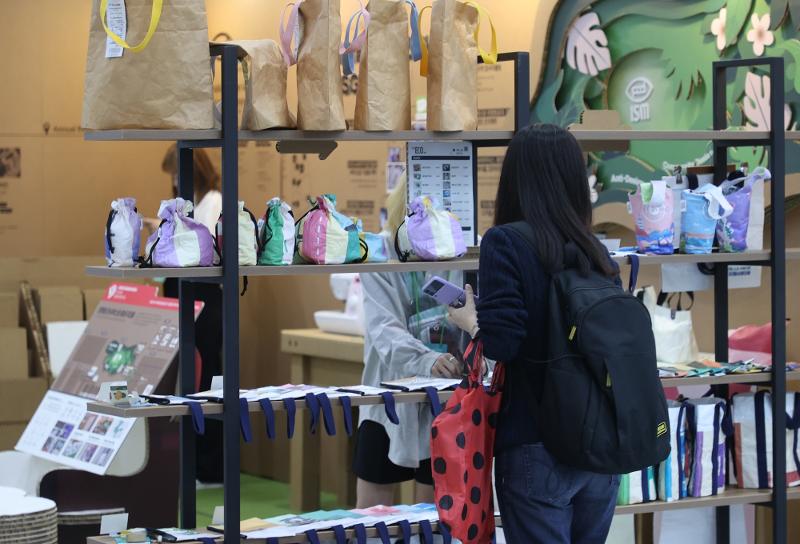
This is an exhibition hall of last year's ESG-Eco Expo Korea at COEX Mall in Seoul's Gangnam-gu District. (Yonhap News)
By Lee Dasom
One of every three people in the country belongs to Generation MZ, referring to millennials and Gen Z members born between 1980 and 2005, with more than half of them residing in the Seoul metropolitan area.
A report also says they prioritize their own happiness and engage in consumption trends reflecting social values.
Statistics Korea on March 25 released a report with this content, "Social Safety and Environmental Awareness by Generation," in the spring 2024 edition of the periodical KOSTAT Statistics Plus.
The country in 2020 had an estimated 16.3 million Gen MZ members, who accounted for the highest share of the overall population with 32.5%. Next came Gen X, or those born from 1964-79, with 26.1% or 13.07 million; senior citizens born before 1954 15.2% or 7.64 million; and baby boomers born from 1955-63 14% or 7.02 million.
In addition, 54.9% of Gen M, or those born from 1980-94, lived in the Seoul metropolitan area while 50.2% of Gen Z, or those born between 1995 and 2005, did so. This means that over half of Gen MZ lived in or around the capital.
Turning to consumption trends, the report said Gen MZ was characterized by the term "YOLO" (you only live once), or placing priority on personal happiness; "meaning out," or value-based consumption; and "flex," or consumption to show off one's existence.
The trend-sensitive Gen MZ was found to aggressively use social media to share its consumption culture and communicate with others.
The periodical also said Gen MZ showed the highest sensitivity to the public safety concerns of "crime" and "new disease outbreaks," while Gen X, baby boomers and the elderly all ranked "new disease outbreaks" as their top fear.
For "environmental concerns by generation," both Gen MZ and senior citizens showed similar responses to problems like fine dust, climate change, harmful chemicals and tap water.
But in "efforts to prevent environmental pollution by generation," Gen MZ was less likely than the elderly to respond to "reducing food waste," "avoiding disposable products" and "lowering the use of synthetic detergents."
Statistics Korea said, "Gen Z and Gen M showed a relatively lower tendency to engage in activities to prevent environmental pollution than other generations because of factors primarily related to household activities."
dlektha0319@korea.kr